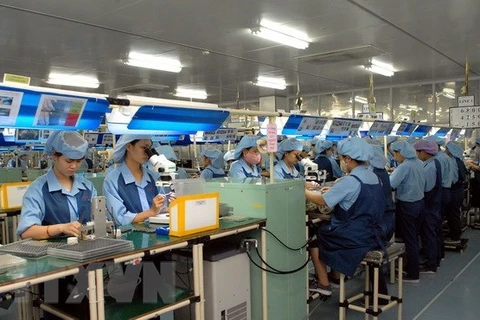Hanoi (VNA) – With the Fourth Industrial Revolution (Industry 4.0) in full swing, many countries – including Vietnam – are in the midst of a new technological wave that not only creates opportunities, but also brings challenges to the local government, businesses, and consumers.
Industry 4.0 will enable Vietnam to boost labour productivity, improve information connectivity, save costs, and much more, however the Government and private companies must also be ready to undergo some substantial reforms in order to stay abreast of these changes.
In Vietnam, revenue from e-commerce was valued at 900 million USD in 2016 (a surge of 50 percent from the previous year) and is likely to mount to 5 billion USD by 2020 (with annual growth of 35 percent) – 2.5 times higher than that of Japan and a global high score, according to Le Quoc Huu, Chief ICT Architect for Smart City at Viettel Telecom Corporation.
However, the Fourth Industrial Revolution will also trigger a fierce competition among domestic and foreign enterprises, said Huu. The biggest barrier for Vietnamese firms is the lack of skilled workers, especially in the ICT sector.
Most firms are small- and medium-sized enterprises, with very small household businesses accounting for more than 31 percent of the country’s GDP. They tend not to have experience or innovation to adapt to the digital economy, not to mention their limited financial and corporate management capability, he noted. Another challenge remains in the country’s overwhelming cash-payment popularity which will not be easy to change.
Industry 4.0 also poses greater cybersecurity and other non-traditional threats which can result in an increase of transnational high-tech crimes. It requires proactive response and control from the Government to ensure privacy for people and security for the country.
At a recent summit themed “Vision and Development Strategy in Industry 4.0”, Prime Minister Nguyen Xuan Phuc affirmed that the Government of Vietnam is committed to developing long-term policies to make use of opportunities from Industry 4.0 and lessen its unwanted effects.
He urged the business community, ministries, state agencies, and people to take practical steps to boos the country’s digital economy and smart industry which is key to the national economic restructuring and growth model transformation driven by improved productivity, efficiency, and competitiveness. –VNA
VNA























